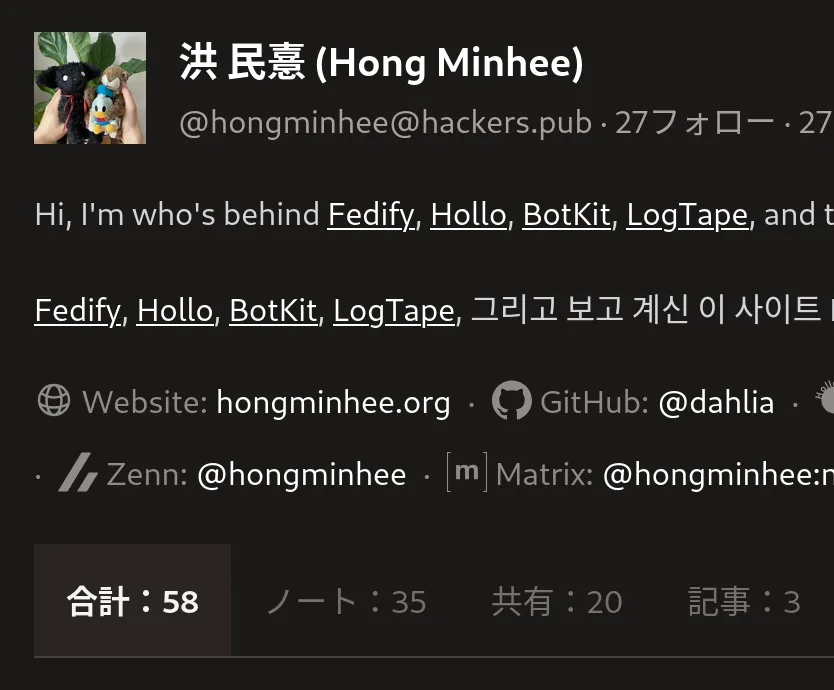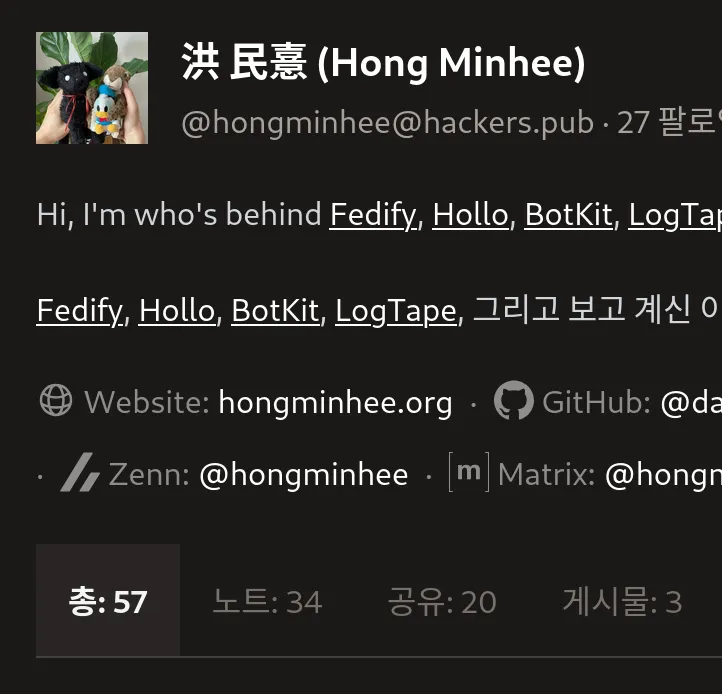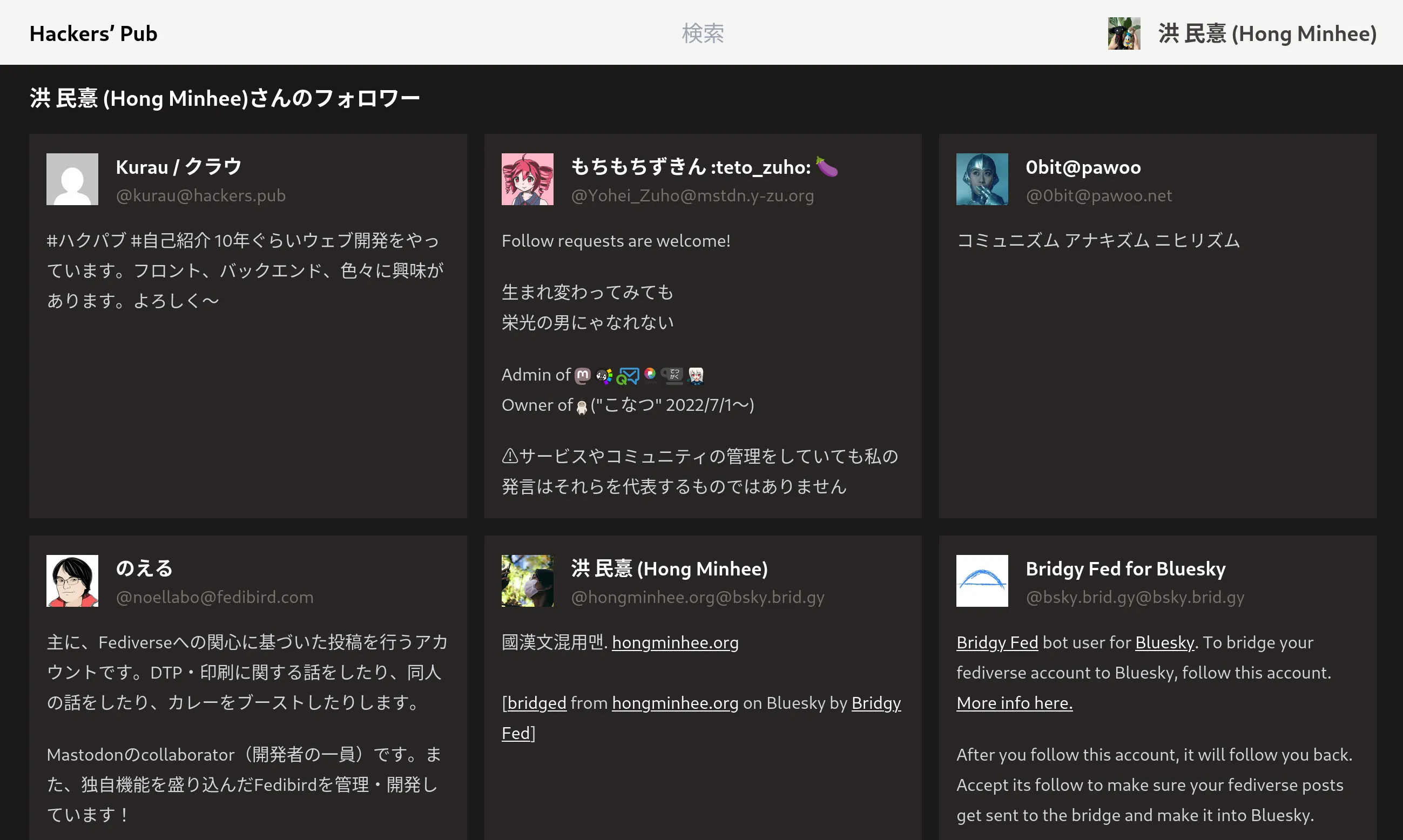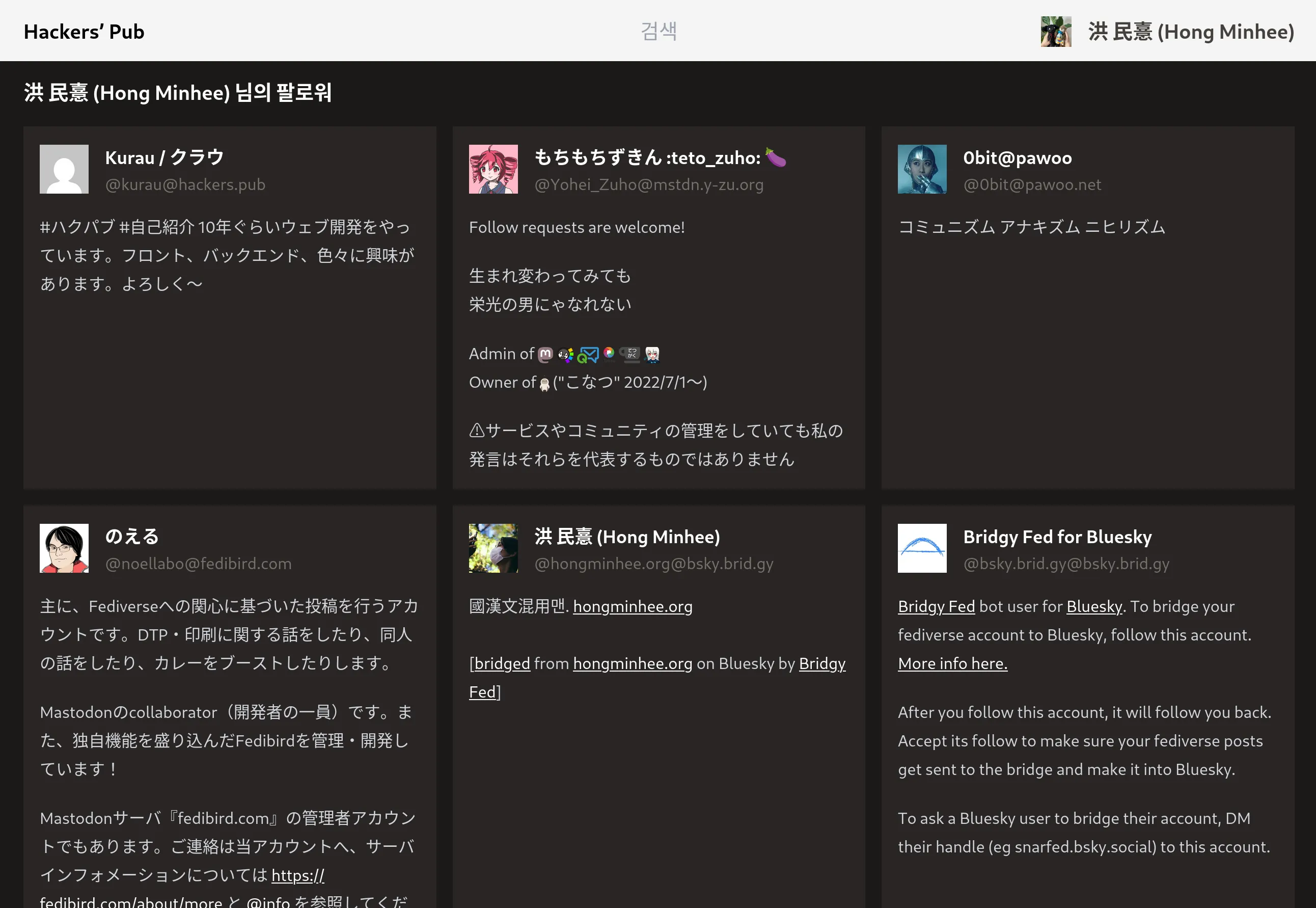時代はDeno
洪 民憙 (Hong Minhee)
@hongminhee@hackers.pub · 374 following · 253 followers
Hi, I'm who's behind Fedify, Hollo, BotKit, and this website, Hackers' Pub!
Fedify, Hollo, BotKit, 그리고 보고 계신 이 사이트 Hackers' Pub을 만들고 있습니다.
Website
- hongminhee.org
GitHub
- @dahlia
Hollo
- @hongminhee@hollo.social
DEV
- @hongminhee
velog
- @hongminhee
Qiita
- @hongminhee
Zenn
- @hongminhee
Matrix
- @hongminhee:matrix.org
X
- @hongminhee
![]() @hongminhee洪 民憙 (Hong Minhee) 두 번 시도해서 두 번 다 타임아웃 났었는데 지금 하니까 되네요 (..) 일시적인 딜레이였던 거 같습니다.
@hongminhee洪 民憙 (Hong Minhee) 두 번 시도해서 두 번 다 타임아웃 났었는데 지금 하니까 되네요 (..) 일시적인 딜레이였던 거 같습니다.
![]() @linear 다행입니다!
@linear 다행입니다!
앱 개발 일만 8년간 한 사람 오늘 드디어 웹 개발 시작한다 시작은 역시 hello world 부터라고 생각합니다 netlify 가입했고 세팅했고 index.html 잘 나오는 거 확인했으니까 오늘은 여기서 끝!
프로필 링크에 아무거나 막 넣을 수 있는 게 아닌 걸까? 네이버 블로그 URL 을 넣었더니 타임아웃이 난다(..)
![]() @linear 어라, 그건 버그 같네요! 혹시 재시도 해보셔도 안 되나요?
@linear 어라, 그건 버그 같네요! 혹시 재시도 해보셔도 안 되나요?
hackers.pub 모바일 앱이 있으면 좋겠다 일단 iOS 개발자가 손을 들어봅니다 ㅋㅋ
![]() @linear 그러게요, 모바일 앱을 하나 만들어야 할 것 같아요. 근데 아직 웹에서 모바일 뷰도 제대로 안 되어서… 그것부터 좀 잘 만들어 두려고요!
@linear 그러게요, 모바일 앱을 하나 만들어야 할 것 같아요. 근데 아직 웹에서 모바일 뷰도 제대로 안 되어서… 그것부터 좀 잘 만들어 두려고요!
![]() @linear 마크다운이 먹는다니 감격스러워 ㅠㅠ
@linear 마크다운이 먹는다니 감격스러워 ㅠㅠ
hackers.pub 모바일 앱이 있으면 좋겠다 일단 iOS 개발자가 손을 들어봅니다 ㅋㅋ
Got an interesting question today about #Fedify's outgoing #queue design!
Some users noticed we create separate queue messages for each recipient inbox rather than queuing a single message and handling the splitting later. There's a good reason for this approach.
In the #fediverse, server response times vary dramatically—some respond quickly, others slowly, and some might be temporarily down. If we processed deliveries in a single task, the entire batch would be held up by the slowest server in the group.
By creating individual queue items for each recipient:
- Fast servers get messages delivered promptly
- Slow servers don't delay delivery to others
- Failed deliveries can be retried independently
- Your UI remains responsive while deliveries happen in the background
It's a classic trade-off: we generate more queue messages, but gain better resilience and user experience in return.
This is particularly important in federated networks where server behavior is unpredictable and outside our control. We'd rather optimize for making sure your posts reach their destinations as quickly as possible!
What other aspects of Fedify's design would you like to hear about? Let us know!
🧪 Experiment with Temporal in ![]() @firefoxnightly!
@firefoxnightly!
The New API has,
✅ Time Zone Support – Easy UTC conversions!
✅ Precise Calculations – Leap years, daylight savings
✅ Built-in Parsing & Formatting – No need for third-party libraries
Start exploring 👇
https://developer.mozilla.org/en-US/docs/Web/JavaScript/Reference/Global_Objects/Temporal
![]() @hongminhee洪 民憙 (Hong Minhee) さんに招待をいただきました。よろしくです。
@hongminhee洪 民憙 (Hong Minhee) さんに招待をいただきました。よろしくです。
![]() @lionhairdino 그러지 않기를 빌겠습니다… 🙏
@lionhairdino 그러지 않기를 빌겠습니다… 🙏
오 hackers pub 모바일 뷰 고쳐졌다
계정 이름에도 커스텀 에모지 표시되게 고쳤다.
아, 생각해 보니 RSS도 추가해야겠다.
Monads: Beyond Simple Analogies—Reflections on Functional Programming Paradigms
洪 民憙 (Hong Minhee) @hongminhee@hackers.pub
While exploring functional programming languages, I've been reflecting on how different communities approach similar concepts. One pattern that seems particularly fascinating is how Haskell and OCaml communities differ in their embrace of monads as an abstraction tool.
The Elegant Power of Monads in Haskell
It's common to hear monads explained through analogies to concepts like JavaScript's Promise or jQuery chains. While these comparisons provide an entry point, they might miss what makes monads truly beautiful and powerful in Haskell's ecosystem.
The real strength appears to lie in the Monad typeclass itself. This elegant abstraction allows for creating generic functions and types that work with any type that shares the monad property. This seems to offer a profound unification of concepts that might initially appear unrelated:
- You can write code once that works across many contexts (
Maybe,[],IO,State, etc.) - Generic functions like
sequence,mapM, and others become available across all monadic types - The same patterns and mental models apply consistently across different computational contexts
For example, a simple conditional function like this works beautifully in any monadic context:
whenM :: Monad m => m Bool -> m () -> m ()
whenM condition action = do
result <- condition
if result then action else return ()Whether dealing with potentially missing values, asynchronous operations, or state transformations, the same function can be employed without modification. There's something genuinely satisfying about this level of abstraction and reuse.
OCaml's Different Approach
Interestingly, the OCaml community seems less enthusiastic about monads as a primary abstraction tool. This might stem from several factors related to language design:
Structural Differences
OCaml lacks built-in typeclass support, relying instead on its module system and functors. While powerful in its own right, this approach might not make monad abstractions feel as natural or convenient:
(* OCaml monad implementation requires more boilerplate *)
module type MONAD = sig
type 'a t
val return : 'a -> 'a t
val bind : 'a t -> ('a -> 'b t) -> 'b t
end
module OptionMonad : MONAD with type 'a t = 'a option = struct
type 'a t = 'a option
let return x = Some x
let bind m f = match m with
| None -> None
| Some x -> f x
endOCaml also doesn't offer syntactic sugar like Haskell's do notation, which makes monadic code in Haskell considerably more readable and expressive:
-- Haskell's elegant do notation
userInfo = do
name <- getLine
age <- readLn
return (name, age)Compared to the more verbose OCaml equivalent:
let user_info =
get_line >>= fun name ->
read_ln >>= fun age ->
return (name, age)The readability difference becomes even more pronounced in more complex monadic operations.
Philosophical Differences
Beyond syntax, the languages differ in their fundamental approach to effects:
- Haskell is purely functional, making monads essential for managing effects in a principled way
- OCaml permits direct side effects, often making monadic abstractions optional
This allows OCaml programmers to write more direct code when appropriate:
(* Direct style in OCaml *)
let get_user_info () =
print_string "Name: ";
let name = read_line () in
print_string "Age: ";
let age = int_of_string (read_line ()) in
(name, age)OCaml's approach might favor pragmatism and directness in many cases, with programmers often preferring:
- Direct use of
optionandresulttypes - Module-level abstractions through functors
- Continuation-passing style when needed
While this directness can be beneficial for immediate readability, it might come at the cost of some of the elegant uniformity that Haskell's monadic approach provides.
Reflections on Language Design
These differences highlight how programming language design shapes the idioms and patterns that emerge within their communities. Neither approach is objectively superior—they represent different philosophies about abstraction, explicitness, and the role of the type system.
Haskell's approach encourages a high level of abstraction and consistency across different computational contexts, which can feel particularly satisfying when working with complex, interconnected systems. There's something intellectually pleasing about solving a problem once and having that solution generalize across many contexts.
OCaml often favors more direct solutions that might be easier to reason about locally, though potentially at the cost of less uniformity across the codebase. This approach has its own virtues, particularly for systems where immediate comprehensibility is paramount.
After working with both paradigms, I find myself drawn to the consistent abstractions that Haskell's approach provides, while still appreciating the pragmatic clarity that OCaml can offer in certain situations. The typeclasses and syntactic support in Haskell seem to unlock a particularly elegant way of structuring code that, while perhaps requiring a steeper initial learning curve, offers a uniquely satisfying programming experience.
What patterns have you noticed in how different programming language communities approach similar problems? And have you found yourself drawn to the elegant abstractions of Haskell or the pragmatic approach of OCaml?
음… Hackers' Pub의 상단 네비게이션 바 디자인을 개선해야 하는데, 어떻게 개선해야 할 지 모르겠다.
계정 이름에도 커스텀 에모지 표시되게 고쳤다.
プロフィールページにフィルターを追加した。ノートだけを見たり、共有した物だけを見たり、記事だけを見たりする事が出来る。
えーと…Hackers' Pubの上部のナビゲーションバーのデザインを改善する必要が有るけど、どの様に改善すれば良いのか分からない。
프로필 페이지에 필터를 추가했다. 노트만 보거나 공유한 것만 보거나 게시물만 볼 수 있다.
음… Hackers' Pub의 상단 네비게이션 바 디자인을 개선해야 하는데, 어떻게 개선해야 할 지 모르겠다.
フォローのお勧めのアルゴリズムを改善した。
https://github.com/dahlia/hackerspub/commit/27f91659687658cdc4490a1320c882ad70cc6766
プロフィールページにフィルターを追加した。ノートだけを見たり、共有した物だけを見たり、記事だけを見たりする事が出来る。
팔로 추천 알고리즘을 개선했다.
프로필 페이지에 필터를 추가했다. 노트만 보거나 공유한 것만 보거나 게시물만 볼 수 있다.
フォローとフォロワーリストを実装した。とりあえずは自分のリストだけを見る事が出来る。
フォローのお勧めのアルゴリズムを改善した。
https://github.com/dahlia/hackerspub/commit/27f91659687658cdc4490a1320c882ad70cc6766
팔로잉 및 팔로워 목록을 구현했다. 일단은 자기 자신의 목록만 볼 수 있다.
팔로 추천 알고리즘을 개선했다.
Hello, Hacker's pub!
これまで実装した機能:
- 共有
- カスタム絵文字
- プロフィールアイコン
- 画像添付
- 検索
- フォローのお勧め
フォローとフォロワーリストを実装した。とりあえずは自分のリストだけを見る事が出来る。
생각해 보니 알림이 없네… 알림도 만들어야지. 할 거 많다.
팔로잉 및 팔로워 목록을 구현했다. 일단은 자기 자신의 목록만 볼 수 있다.
Hacker's pub은 모바일에서 쓰기엔 제약이 많나... 아무래도 블로그가 메인이니
@markeb54맹꽁이 적어도 웹으로라도 모바일에서 쓸 수 있게 하는 게 목표이긴 합니다. 여유가 생기면 모바일 앱도 만들고 싶긴 해요…
Hello, world!
プロフィールページにOpen Graphの画像を追加した。
これまで実装した機能:
- 共有
- カスタム絵文字
- プロフィールアイコン
- 画像添付
- 検索
- フォローのお勧め
아 또 있다.
- 게시물 (
Note) 수정 및 삭제 (Article은 수정 가능한데Note는 아직 안 됨) - 팔로잉 및 팔로워 목록
생각해 보니 알림이 없네… 알림도 만들어야지. 할 거 많다.
My first post in Hackers' Pub!
저는 얼굴인식 카메라 앱 슈티를 개발하고 있습니다 iOS 버전 링크, 안드로이드 버전 링크
세션 타입 좋습니다 여러분
hello, world
앞으로 또 해야 할 것들… 뭐부터 해야 할까?
- 좋아요 및 에모지 리액션: 좋아요와 에모지 리액션을 별개로 구현할지(Hollo 방식), 좋아요를 에모지 리액션의 한 종류로 구현할지(Misskey 방식) 고민중…
- 인용 공유
- 사용자 이름에도 커스텀 에모지 지원
- 알고리즘 타임라인
- 게시물 번역: 대충 프롬프트는 만들었는데, 어떤 모델을 쓸 지 고민중…
아 또 있다.
- 게시물 (
Note) 수정 및 삭제 (Article은 수정 가능한데Note는 아직 안 됨) - 팔로잉 및 팔로워 목록
팔로 추천 기능을 구현했다!
앞으로 또 해야 할 것들… 뭐부터 해야 할까?
- 좋아요 및 에모지 리액션: 좋아요와 에모지 리액션을 별개로 구현할지(Hollo 방식), 좋아요를 에모지 리액션의 한 종류로 구현할지(Misskey 방식) 고민중…
- 인용 공유
- 사용자 이름에도 커스텀 에모지 지원
- 알고리즘 타임라인
- 게시물 번역: 대충 프롬프트는 만들었는데, 어떤 모델을 쓸 지 고민중…
ハクパブに初投稿です。どう使おうかはまだ模索中だけど、よろしく
처음 계정 만들고 나면 팔로를 아무도 안 해서 타임라인이 비어 있는 문제를 해결하기 위해, 팔로할 만한 계정 추천이 뜨도록 구현하고 있다.
팔로 추천 기능을 구현했다!
그냥 PostgreSQL의 ILIKE 연산자를 활용한 거긴 하지만, 나이브한 검색을 구현했다. 그리고 from:이나 lang: 같은 연산자도 구현했다.
처음 계정 만들고 나면 팔로를 아무도 안 해서 타임라인이 비어 있는 문제를 해결하기 위해, 팔로할 만한 계정 추천이 뜨도록 구현하고 있다.
어설프게 나마 검색 기능 구현중…
그냥 PostgreSQL의 ILIKE 연산자를 활용한 거긴 하지만, 나이브한 검색을 구현했다. 그리고 from:이나 lang: 같은 연산자도 구현했다.
별 거 아니지만, 로그인 안 한 상태에서 댓글 다는 방법을 안내하도록 해봤다.
어설프게 나마 검색 기능 구현중…
![]() @hongminhee洪 民憙 (Hong Minhee) this would be a lovely thing to see a blog post about, as I don't think many projects in the fediverse have implemented such a thing.
@hongminhee洪 民憙 (Hong Minhee) this would be a lovely thing to see a blog post about, as I don't think many projects in the fediverse have implemented such a thing.
![]() @liaizon꧁ wakest ꧂ Okay, I compose a blog post about this: Hackers' Pub Introduces Flexible Username Changes: Breaking the Fediverse Norm!
@liaizon꧁ wakest ꧂ Okay, I compose a blog post about this: Hackers' Pub Introduces Flexible Username Changes: Breaking the Fediverse Norm!
Hackers' Pub Introduces Flexible Username Changes: Breaking the Fediverse Norm
洪 民憙 (Hong Minhee) @hongminhee@hackers.pub
Hackers' Pub is a community-focused platform where programmers and technology enthusiasts share knowledge and experiences. As an ActivityPub-enabled social network, it allows users to connect with others across the broader fediverse ecosystem, bringing technical discussions and insights directly to followers' feeds.
In the fediverse landscape, your username is typically set in stone once chosen. Most ActivityPub-powered platforms like Mastodon, Pleroma, and others enforce this permanence as a fundamental design principle. However, Hackers' Pub is charting a different course with a more flexible approach to digital identity.
One-Time Username Change: Freedom with Responsibility
Unlike most fediverse platforms, Hackers' Pub now allows users to change their username (the part before the @ in your Fediverse handle) exactly once during the lifetime of their account. This policy acknowledges that people grow, interests evolve, and the username that seemed perfect when you joined might not represent who you are today.
This one-time change limit strikes a careful balance—offering flexibility while maintaining the stability and reliability that's essential for a federated network.
Username Recycling: New Opportunities
When you change your username on Hackers' Pub, your previous username becomes available for other users to claim. This recycling mechanism creates new opportunities for meaningful usernames to find their most fitting owners, rather than remaining permanently locked to accounts that no longer use them.
For newcomers to the platform, this means a wider selection of desirable usernames might become available over time—something virtually unheard of in the traditional fediverse ecosystem.
Link Preservation: Maintaining Digital History
Worried about broken links after changing your username? Hackers' Pub has implemented a thoughtful solution. All permalinks containing your original username will continue to function until someone else claims that username. This approach helps preserve the web of connections and conversations that make the fediverse valuable.
This temporary preservation period gives your connections time to adjust to your new identity while preventing immediate link rot across the federation.
The Technical Foundation: ActivityPub Actor URIs
What enables Hackers' Pub to offer username changes while other fediverse platforms can't? The answer lies in how actor identities are implemented at the protocol level.
Hackers' Pub uses UUID-based actor URIs that don't contain the username. For example, a user with handle @hongminhee has an underlying ActivityPub actor URI that looks like https://hackers.pub/ap/actors/019382d3-63d7-7cf7-86e8-91e2551c306c. Since the username isn't part of this permanent identifier, it can be changed without breaking federation connections.
This contrasts sharply with platforms like Mastodon, where a user @hongminhee has an actor URI of https://mastodon.social/users/hongminhee. With the username embedded directly in the URI, changing it would break all federation connections, which is why these platforms don't allow username changes.
This architectural choice gives Hackers' Pub the technical flexibility to implement username changes while maintaining account continuity across the fediverse.
GitHub-Inspired Approach
Those familiar with GitHub might recognize this model—Hackers' Pub has adapted GitHub's username change policy for the fediverse context. This approach brings the best of both worlds: the option for identity evolution from centralized platforms and the federation benefits of the fediverse.
What This Means for Users
For Hackers' Pub users, this policy offers a significant advantage over other fediverse instances:
- You can correct an unfortunate username choice
- Your online identity can evolve as you do
- Your content history remains intact during the transition
- You maintain your social connections despite the change
The Future of Fediverse Identity
Hackers' Pub's username policy represents an interesting experiment in the fediverse—testing whether more flexible identity management can coexist with the stability needed for federation. If successful, we might see other platforms adopt similar approaches, creating a more adaptable yet still interconnected social web.
For now, users should consider this policy a compelling reason to choose Hackers' Pub as their fediverse home, especially if username flexibility matters to their online experience.
Hackers' Pub is currently in invitation-only beta. If you're interested in trying out the platform and its unique username policy, please leave your email address in the comments below. We'll add you to the allowlist, enabling you to sign up directly on the website. Note that this doesn't involve sending invitation emails—your address will simply be approved for registration when you visit the signup page.
눈에 띄는 업데이트는 아니지만, 아이디를 바꿨을 때 예전 아이디로 된 링크들이 유지되게 했다. (GitHub과 비슷한 동작.)
![]() @hongminhee洪 民憙 (Hong Minhee) wait can you explain this?! Can you now change your username and it doesn't kill all the old links to your posts?
@hongminhee洪 民憙 (Hong Minhee) wait can you explain this?! Can you now change your username and it doesn't kill all the old links to your posts?
![]() @hongminhee洪 民憙 (Hong Minhee) wait can you explain this?! Can you now change your username and it doesn't kill all the old links to your posts?
@hongminhee洪 民憙 (Hong Minhee) wait can you explain this?! Can you now change your username and it doesn't kill all the old links to your posts?
![]() @liaizon꧁ wakest ꧂ Yes, exactly!
@liaizon꧁ wakest ꧂ Yes, exactly!
- You have a only chance to change your username.
- If you change your username, your old username becomes available for others.
- If you change your username, every old permalink with your old username will remain until someone takes your old username.
Hello, hackers pub!
【輪読会やってみます!】
#FediLUG  輪読会📖第零弾として #fedify の開発者である
輪読会📖第零弾として #fedify の開発者である
Hong Minhee (洪 民憙) ![]() @hongminhee洪 民憙 (Hong Minhee) さんの著書『自分だけのフェディバースのマイクロブログを作ろう!』の輪読会を行います!
@hongminhee洪 民憙 (Hong Minhee) さんの著書『自分だけのフェディバースのマイクロブログを作ろう!』の輪読会を行います!
この機会に #Fedify を使用して皆さんで #ActivityPub や #TypeScript などの知識を強化しませんか?
本はGitHubから無料で読むことができます:
https://github.com/dahlia/fedify-microblog-tutorial-ja
参加:
https://fedilug.connpass.com/event/348240/
Fedify는 새로운 후원 파트너를 찾고 있습니다!
 Fedify란?
Fedify란?
Fedify는 #ActivityPub 기반 연합형 서버 프레임워크로, 개발자들이 분산형 소셜 네트워크인 #연합우주(#fediverse)에 애플리케이션을 쉽게 통합할 수 있도록 돕습니다. 복잡한 ActivityPub 프로토콜 구현을 단순화하여 개발 시간을 크게 단축시킵니다. MIT 라이선스 하에 제공되는 오픈 소스 프로젝트입니다.
💼 Fedify를 활용하는 프로젝트들
다양한 프로젝트들이 이미 Fedify를 활용하고 있습니다:
- Ghost: 수백만 사용자를 보유한 전문적인 오픈 소스(MIT 라이선스) 퍼블리싱 플랫폼으로, Fedify의 주요 후원사이자 파트너입니다.
- Hollo: 개인 사용자를 위한 경량 마이크로블로그 (오픈 소스, AGPL-3.0)
- Hackers' Pub: 소프트웨어 엔지니어를 위한 연합우주 블로그 플랫폼 (오픈 소스, AGPL-3.0)
- Encyclia: ORCID 학술 기록을 ActivityPub을 통해 제공하는 브리지 서비스
🚀 Fedify가 제공하는 가치
- 개발 시간 80% 단축: ActivityPub의 복잡한 구현 대신 검증된 프레임워크 활용
- 즉각적인 연합우주 호환성: Mastodon, Misskey, Pleroma, Pixelfed, PeerTube 등 다양한 연합우주 서비스와 즉시 호환
- 전문 기술 지원: ActivityPub 및 연합 프로토콜 전문가의 직접 지원
- 맞춤형 개발: 귀사의 특정 요구사항에 맞는 맞춤형 기능 개발
🤝 가능한 협력 모델
- 맞춤형 컨설팅 및 통합 지원: 귀사 플랫폼에 #Fedify 통합을 위한 전문적 지원
- 맞춤형 기능 개발 의뢰: 귀사에 필요한 특정 기능의 개발 및 구현
- 장기적인 기술 파트너십: 지속적인 개발 및 유지보수를 위한 장기 협력 관계
🌟 Fedify와 협력했을 때의 이점
- 기술적 이점: 자체 구현 대비 시간과 리소스 절약
- 브랜드 이미지: 오픈 소스 생태계 지원을 통한 기업 이미지 강화
- 분산형 소셜 네트워크 진입: 연합우주 생태계에 쉽게 참여
- 경쟁 우위: 소셜 기능을 통한 제품 경쟁력 강화
📩 관심이 있으신가요?
ActivityPub 구현을 고려 중이시거나, Fedify 프로젝트와 협력하고 싶으시다면 연락 주세요:
- 이메일: sponsor@fedify.dev
- 연합우주:
@fedifyFedify: an ActivityPub server framework
- GitHub: https://github.com/fedify-dev/fedify
귀사의 요구사항과 목표에 맞는 맞춤형 협력 방안을 함께 모색하겠습니다.
Fedifyは新しいパートナーシップの機会を探しています!
 Fedifyとは?
Fedifyとは?
Fedifyは、ActivityPubベースのフェデレーションサーバーフレームワークで、開発者が分散型ソーシャルネットワークである#フェディバース(#fediverse)にアプリケーションを簡単に統合できるよう支援します。複雑なActivityPubプロトコルの実装を簡素化し、開発時間を大幅に短縮します。MITライセンスの下で提供されるオープンソースプロジェクトです。
💼 Fedifyを活用しているプロジェクト
すでに様々なプロジェクトがFedifyを活用しています:
- Ghost:数百万人のユーザーを持つプロフェッショナルな出版プラットフォーム(MITライセンスのオープンソース)で、Fedifyの主要スポンサー兼パートナーです。
- Hollo:個人ユーザー向けの軽量マイクロブログ(オープンソース、AGPL-3.0)
- Hackers' Pub:ソフトウェアエンジニア向けのフェディバースブログプラットフォーム(オープンソース、AGPL-3.0)
- Encyclia:ORCID学術記録をActivityPubを通じて提供するブリッジサービス
🚀 Fedifyが提供する価値
- 開発時間80%削減:複雑なActivityPub実装の代わりに実証済みフレームワークを活用
- 即時Fediverse互換性:Mastodon、Misskey、Pleroma、Pixelfed、PeerTubeなど様々なFediverseサービスとすぐに互換
- 専門技術サポート:ActivityPubおよびフェデレーションプロトコルの専門家による直接サポート
- カスタム開発:お客様の特定要件に合わせた機能開発
🤝 可能な協力モデル
- カスタムコンサルティングと統合サポート:お客様のプラットフォームへのFedify統合のための専門的支援
- カスタム機能開発:お客様のプラットフォームに必要な特定機能の開発と実装
- 長期的な技術パートナーシップ:継続的な開発とメンテナンスのための長期協力関係
🌟 Fedifyとの協力によるメリット
- 技術的優位性:自社開発と比較して時間とリソースの節約
- ブランドイメージ:オープンソースエコシステムへの支援を通じた企業イメージの向上
- 分散型ソーシャルネットワークへの参入:フェディバースエコシステムへの容易な参加
- 競争優位性:ソーシャル機能による製品競争力の強化
📩 興味をお持ちですか?
ActivityPubの実装をご検討中の方や、Fedifyプロジェクトとの協力にご興味のある方は、ぜひご連絡ください:
- メール:sponsor@fedify.dev
- フェディバース:
@fedifyFedify: an ActivityPub server framework
- GitHub:https://github.com/fedify-dev/fedify
お客様の要件と目標に合わせたカスタマイズされた協力の可能性を一緒に探りましょう。
Fedify is looking for new partnership opportunities!
 What is Fedify?
What is Fedify?
#Fedify is an #ActivityPub-based federated server framework that helps developers easily integrate their applications with the #fediverse, a decentralized social network. It simplifies the complex implementation of the ActivityPub protocol, significantly reducing development time. Fedify is an open-source project available under the MIT license.
💼 Projects using Fedify
Various projects are already leveraging Fedify:
- Ghost: A professional publishing platform with millions of users, open source under MIT license, and a major sponsor and partner of Fedify.
- Hollo: A lightweight microblogging platform for individual users (open source, AGPL-3.0)
- Hackers' Pub: A fediverse blogging platform for software engineers (open source, AGPL-3.0)
- Encyclia: A bridge service that makes ORCID academic records available via ActivityPub
🚀 Value provided by Fedify
- 80% development time reduction: Utilize a proven framework instead of complex ActivityPub implementation
- Immediate fediverse compatibility: Instant compatibility with various fediverse services including Mastodon, Misskey, Pleroma, Pixelfed, PeerTube, etc.
- Expert technical support: Direct support from ActivityPub and Federation protocol experts
- Custom development: Tailored feature development to meet your specific requirements
🤝 Potential collaboration models
- Custom consulting and integration support: Professional assistance for integrating Fedify into your platform
- Custom feature development: Development and implementation of specific features needed for your platform
- Long-term technical partnership: Long-term collaboration for continuous development and maintenance
🌟 Benefits of collaborating with Fedify
- Technical advantage: Save time and resources compared to in-house implementation
- Brand image: Enhance corporate image through support of the open-source ecosystem
- Entry to decentralized social networks: Easily participate in the fediverse ecosystem
- Competitive edge: Strengthen product competitiveness through social features
📩 Interested?
If you're considering implementing ActivityPub or wish to collaborate with the Fedify project, please get in touch:
- Email: sponsor@fedify.dev
- Fediverse:
@fedifyFedify: an ActivityPub server framework
- GitHub: https://github.com/fedify-dev/fedify
We're excited to explore customized collaboration opportunities that align with your requirements and goals.
Fedify는 새로운 후원 파트너를 찾고 있습니다!
 Fedify란?
Fedify란?
Fedify는 #ActivityPub 기반 연합형 서버 프레임워크로, 개발자들이 분산형 소셜 네트워크인 #연합우주(#fediverse)에 애플리케이션을 쉽게 통합할 수 있도록 돕습니다. 복잡한 ActivityPub 프로토콜 구현을 단순화하여 개발 시간을 크게 단축시킵니다. MIT 라이선스 하에 제공되는 오픈 소스 프로젝트입니다.
💼 Fedify를 활용하는 프로젝트들
다양한 프로젝트들이 이미 Fedify를 활용하고 있습니다:
- Ghost: 수백만 사용자를 보유한 전문적인 오픈 소스(MIT 라이선스) 퍼블리싱 플랫폼으로, Fedify의 주요 후원사이자 파트너입니다.
- Hollo: 개인 사용자를 위한 경량 마이크로블로그 (오픈 소스, AGPL-3.0)
- Hackers' Pub: 소프트웨어 엔지니어를 위한 연합우주 블로그 플랫폼 (오픈 소스, AGPL-3.0)
- Encyclia: ORCID 학술 기록을 ActivityPub을 통해 제공하는 브리지 서비스
🚀 Fedify가 제공하는 가치
- 개발 시간 80% 단축: ActivityPub의 복잡한 구현 대신 검증된 프레임워크 활용
- 즉각적인 연합우주 호환성: Mastodon, Misskey, Pleroma, Pixelfed, PeerTube 등 다양한 연합우주 서비스와 즉시 호환
- 전문 기술 지원: ActivityPub 및 연합 프로토콜 전문가의 직접 지원
- 맞춤형 개발: 귀사의 특정 요구사항에 맞는 맞춤형 기능 개발
🤝 가능한 협력 모델
- 맞춤형 컨설팅 및 통합 지원: 귀사 플랫폼에 #Fedify 통합을 위한 전문적 지원
- 맞춤형 기능 개발 의뢰: 귀사에 필요한 특정 기능의 개발 및 구현
- 장기적인 기술 파트너십: 지속적인 개발 및 유지보수를 위한 장기 협력 관계
🌟 Fedify와 협력했을 때의 이점
- 기술적 이점: 자체 구현 대비 시간과 리소스 절약
- 브랜드 이미지: 오픈 소스 생태계 지원을 통한 기업 이미지 강화
- 분산형 소셜 네트워크 진입: 연합우주 생태계에 쉽게 참여
- 경쟁 우위: 소셜 기능을 통한 제품 경쟁력 강화
📩 관심이 있으신가요?
ActivityPub 구현을 고려 중이시거나, Fedify 프로젝트와 협력하고 싶으시다면 연락 주세요:
- 이메일: sponsor@fedify.dev
- 연합우주:
@fedifyFedify: an ActivityPub server framework
- GitHub: https://github.com/fedify-dev/fedify
귀사의 요구사항과 목표에 맞는 맞춤형 협력 방안을 함께 모색하겠습니다.
Fedify is looking for new partnership opportunities!
 What is Fedify?
What is Fedify?
#Fedify is an #ActivityPub-based federated server framework that helps developers easily integrate their applications with the #fediverse, a decentralized social network. It simplifies the complex implementation of the ActivityPub protocol, significantly reducing development time. Fedify is an open-source project available under the MIT license.
💼 Projects using Fedify
Various projects are already leveraging Fedify:
- Ghost: A professional publishing platform with millions of users, open source under MIT license, and a major sponsor and partner of Fedify.
- Hollo: A lightweight microblogging platform for individual users (open source, AGPL-3.0)
- Hackers' Pub: A fediverse blogging platform for software engineers (open source, AGPL-3.0)
- Encyclia: A bridge service that makes ORCID academic records available via ActivityPub
🚀 Value provided by Fedify
- 80% development time reduction: Utilize a proven framework instead of complex ActivityPub implementation
- Immediate fediverse compatibility: Instant compatibility with various fediverse services including Mastodon, Misskey, Pleroma, Pixelfed, PeerTube, etc.
- Expert technical support: Direct support from ActivityPub and Federation protocol experts
- Custom development: Tailored feature development to meet your specific requirements
🤝 Potential collaboration models
- Custom consulting and integration support: Professional assistance for integrating Fedify into your platform
- Custom feature development: Development and implementation of specific features needed for your platform
- Long-term technical partnership: Long-term collaboration for continuous development and maintenance
🌟 Benefits of collaborating with Fedify
- Technical advantage: Save time and resources compared to in-house implementation
- Brand image: Enhance corporate image through support of the open-source ecosystem
- Entry to decentralized social networks: Easily participate in the fediverse ecosystem
- Competitive edge: Strengthen product competitiveness through social features
📩 Interested?
If you're considering implementing ActivityPub or wish to collaborate with the Fedify project, please get in touch:
- Email: sponsor@fedify.dev
- Fediverse:
@fedifyFedify: an ActivityPub server framework
- GitHub: https://github.com/fedify-dev/fedify
We're excited to explore customized collaboration opportunities that align with your requirements and goals.











 🍆
🍆